| Reviews & Columns |
|
Reviews DVD TV on DVD Blu-ray 4K UHD International DVDs In Theaters Reviews by Studio Video Games Features Collector Series DVDs Easter Egg Database Interviews DVD Talk Radio Feature Articles Columns Anime Talk DVD Savant Horror DVDs The M.O.D. Squad Art House HD Talk Silent DVD
|
DVD Talk Forum |
|
|
| Resources |
|
DVD Price Search Customer Service #'s RCE Info Links |
|
Columns
|
|
|
Dragon Ball Z Kai: Season Three
FUNimation // Unrated // September 11, 2012
List Price: $54.98 [Buy now and save at Amazon]
*All images in this review taken from the Blu-ray discs in this set. Click on all images to view full size caps.
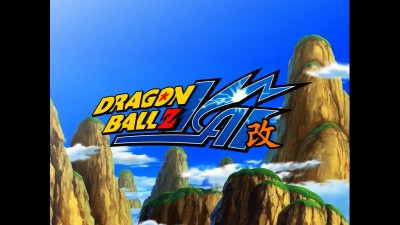
"As nice of an idea as Dragon Ball Z Kai was, I personally feel it took away one of the greatest strengths from the series as a whole - The sagas all made use of the (very) slow burn technique, but that's what made many of the big reveals such a big payoff. You invested your time hanging on the edge of your seat, and in the end you were greatly rewarded. Kai offers all the payoff with little build-up or viewing discipline, and in my opinion, greatly reduces the effect of many of the best moments the series has had to offer." - From my Dragon Ball Z Level 1.1 review
The nice thing about opinions? They're always subject to change.
At the time of that writing, I was against the idea of Kai (which in and of itself means 'revised') based on principle. With new technology spilling out by the minute, the latest generation has had their attention span reduced to nanoseconds. That may seem like an unfair assessment, but just think about the current trends in entertainment - Setting aside the time to listen to an album as a whole has gone by the wayside. Now, music is played on devices dedicated to shuffling songs. Sitting down to watch a movie is also hindered, as people constantly take themselves out of the experience to play with their cell phones. So, I felt that Kai was attempting to grab the attention of future generations by replacing the slow burning fuse of DBZ with a speedy trail of gunpowder instead.
Part of the fun of watching Dragon Ball Z, at least the first time around, was playing the waiting game. There were plenty of episodes that did little more than focus on stalling the villain, powering up a (hopefully) devastating attack, or having the main characters go off on needless diatribes. This may sound less than ideal, but it was all done to build the anticipation before delivering exactly what you were waiting for. At least, that's what I used to think. Don't get me wrong - I still think in its uncut form, DBZ is the only way to go about watching the series for the first time. On subsequent viewings? Well, being a husband and father, finding the time to choke down almost 300 episodes is nearly impossible. I have a huge backlog of movies and television shows that I would like to eventually get through, and outside of that, I have a social life and I'm trying to learn how to forge/blacksmith. Suddenly, the convenience of Dragon Ball Z Kai was looking pretty good...
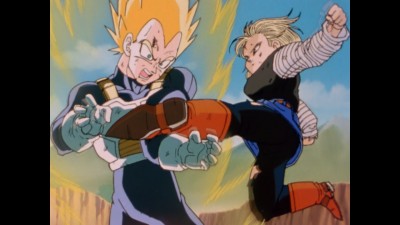
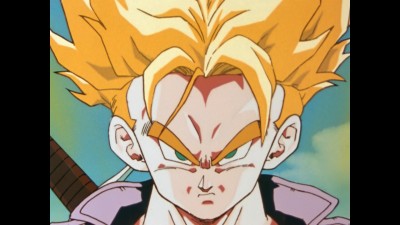
After doing a bit of research, I found that Dragon Ball Z Kai was done to celebrate the 20th anniversary of the show. Although I'm still thoroughly convinced it was merely a way to keep the series 'milkable' for generations to come, my interest was fully piqued with the changes that were going to be made to the series. For one, Kai was going to drop everything that happened after the Cell Games Saga. The fact that I'll never have to watch the Great Saiyaman in action again thrilled me to no end. Second, new scripts and dialogue were written in order to emulate the original Manga as close as possible. A new English dub was done with most of the original cast, and if any animation was deemed unfit for high-def viewing, it would be replaced. The end result? 291 episodes have now been effectively reduced to a manageable 98.
********
The previous season of Dragon Ball Z Kai was a wild ride, but things were beginning to feel too formulaic. There's no question that Season Three needed to change things up, and drastically at that. After battling Radditz, two additional Saiyans, the Ginyu Force/Captain Ginyu and the nearly invincible Frieza, the series was repeating itself exhaustively. Everything was the same - There's a warning about some bad guys coming, the Z Force train for a while, the bad guys arrive and discard of Goku's friends one by one, until he eventually enters the fray at the last minute to partake in an epic battle to save the world from certain doom. The third season is comparatively similar, as this tired formula is still at the center of all the action. So, why is it that the third season still actually works as well as everything that came before it?
In short, the moving parts helping to drive the story have been altered significantly, and although things are more or less the same, there's additional layers that have been added to the story in an attempt to keep things fresh:
The Z Force fighters can't believe their eyes when Frieza comes back from the grave to threaten their existence yet again, but a mysterious stranger from the future, a Super Saiyan at that, arrives and puts an end to the white and purple tyrant without so much as breaking a sweat. The mystery Saiyan then conveys that a pair of androids, instruments designed by a mad scientist who is looking to settle a score, will appear in a few short years to destroy Goku. Furthermore, the fighter from the future also reveals that Goku is suffering from an incurable form of heart disease, and may not live long enough to neutralize the android threat. So, the Z Force goes into training, and three years later they finally get to size up their opponents. Unfortunately, the two androids turn into more, and in typical Dragon Ball fashion, they prove to be nearly invincible adversaries. Even then, these machines seem like tinker-toys compared to the villain that reveals himself near the end of the season - The android Cell.
The third season's storyline packs a bit more drama and introduces new elements of danger. The fact that Goku is dealing with a serious heart condition really ups the ante, as he could perish before the androids have a chance to be dismantled in battle. It's a game changer, for sure, as the other Z Fighters would really be lost without their ace in the hole. Normally we have to wait for Goku to arrive at the battlefield, but having him instead fight against a ticking clock is a breath of fresh air. Going into further details about the season would undoubtedly spoil some of the story, so I'll merely say that there are some major twists along the way that not only shocked the Z Force fighters, but left my jaw agape the first time I watched the series. I was concerned that some of the major story elements in season three would be hampered by revisions and editing, but Kai is very careful not to cut anything that would leave viewers scratching their heads.
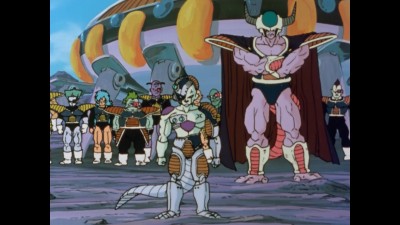
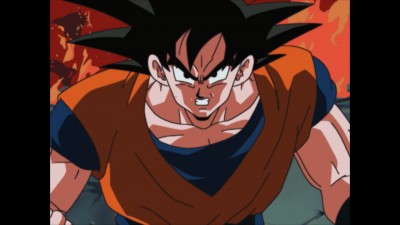
No, the only real downside to the Androids Saga is that it's not as self contained as the Saiyan or Frieza sagas. After all is said and done, the third season merely acts as a lengthy build-up to Cell's big reveal. As many of you already know, Cell ends up being the main antagonist throughout the fourth and final season of Kai, and since everything in the third season culminates to his arrival, this batch of episodes ends up feeling a bit more disposable than the rest. Don't get me wrong - I enjoy the Androids Saga for everything it has to offer, but it's this particular reason that I find the third season to be the weakest of the bunch, despite the fact the story decidedly took some bold changes and managed to keep the series feeling fresh, if not invigorated (in a way).
That being said, Dragon Ball Z has never really been about producing strong storytelling devices, right? Right. It's about action, pure and simple. Yes, introducing Goku's heart disease and unveiling a mysterious Super Saiyan from the future is a big step in the right direction, but there's nothing revolutionary about that. No, it's the increased action and pace that make the third season so exhilarating. Everyone steps up to the plate this time around and shows us levels of power unlike anything we've seen before. I know there are probably a lot of people that disagree with me in the respect that this season almost feels like filler material, especially since it extends on a plot point that was originally introduced in the original Dragon Ball series. Still, it's a minor quibble, as this is the most intense and action packed DBZ thus far. For those of you who are watching for action for action's sake, you just might find this to be the best season yet.
********
The more I watch Kai, the more I consider it to be my preferred version of Dragon Ball Z. That being said, this new iteration of DBZ still leaves a bit to be desired - Some of the vocal talent had to be replaced due to unavoidable circumstances, and some of it seems to be inferior to the English dubs that came before it. Also, the amount of blood and 'gore' (if you can call it that) has been toned down a bit. Although this is nothing new to those familiar with DBZ in the States, this still comes as something of a head scratcher. After all, the series is practically bathed in one form of violence or another, so why go through the trouble of censoring a little blood? Despite these minor quibbles, the good outweighs the bad by a large margin. The English dub is now more faithful to the Japanese script, and returning cast members deliver a performance that easily bests their work on the first go-round. Even though there still may be a small amount of questionable filler left in the mix, the revisions keep the action fast and furious without compromising any vital bits of story. One of the reasons why Dragon Ball Z had so much filler to begin with, was so the series wouldn't catch up to the Manga and be left with no story to tell. Now that the filler has been mostly removed, the series really does seem like it's found new life and can withstand numerous repeated viewings.
There's still something to be said about having patience and enduring the slow burn in the original series. In fact, I still highly recommend that newcomers watch Dragon Ball Z in its uncut form to experience that effect, but for the previously initiated, Kai is a breath of fresh air. Not just in its drastic reduction from 291 episodes to a brisk 98, but since there are only four seasons to purchase (or 8 'parts' that are half the price of the full season set), you don't have to sacrifice your bank account or even a lot of shelf space to store the series. Even if you do decide to start with Kai right off the bat, I can say with confidence that you won't come out at the end feeling like you've watched a gimped version of the show. As a DBZ veteran myself, I wasn't made to feel that way either. You can't go wrong with Kai, familiar with the original source or not.
Video
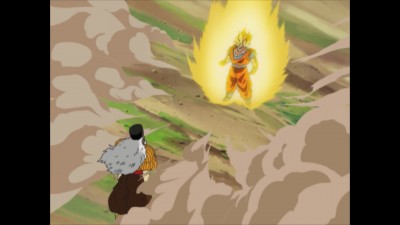
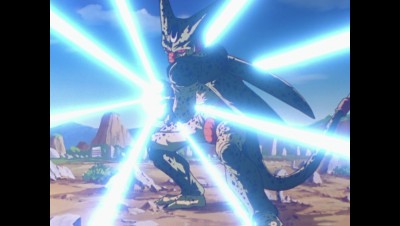
I was somewhat underwhelmed by the 1080p, AVC encoded image (4:3), but that's probably because I've watched the Level sets prior to seeing Kai. The Level sets were a massive undertaking by FUNimation, as the original 16mm elements were scanned and were subsequently subjected to a clean-up project that fortunately didn't implement any digital noise reduction. What we were given was an image that was as faithful to the source as possible, and for the first time ever, actually allowed Dragon Ball Z to look like film as opposed to the overly contrasted Dragon Box sets, or the cropped digitally scrubbed 'Orange Brick' season sets.
Dragon Ball Z Kai features an HD remaster from Toei Animation's source, and they've painstakingly cleaned up most of the imperfections, which results in a respectably clean presentation. The image is a little on the soft however and is mostly devoid of grain, so some DNR is evident. That being said, I'm not exactly sure I blame them for doing so. DBZ has always looked 'clean' on television, but more important, any section of animation that was deemed unfit for HD was actually replicated with new animation. I assume 'cleaning' the source of heavy grain would allow the new animation to fit with the old seamlessly, and I have to say that I'm pretty impressed with the results. Shadowing and changes in line consistency are dead giveaways, but if you're not one to notice that sort of thing you'll be hard pressed to notice where the new footage has been spliced with the old. This is especially impressive when one considers that there are new pieces of animation also created for the purpose of bridging minor story gaps.
As far as the technical presentation on these discs, there's really nothing to complain about. Black levels are fairly solid, contrast and colors are presented without the harsh boosting that was apparent on the Dragon Box sets, and digital anomalies are minimal even at their very worst. After all is said and done, Kai isn't the absolute best I've seen Dragon Ball Z look to date, but it's still a nice leap from the previous DVD incarnations that didn't have a lot going for them in the first place.
Audio
This release contains both Japanese and English audio tracks (Dolby TrueHD 2.0 and Dolby TrueHD 5.1 respectively), and these are brand spankin' new in every conceivable way. Both languages feature newly recorded dialogue from (most of) the original voice actors, and they now sound clean as a whistle. Unfortunately, the rest of the sound design is still somewhat flat, but the English 5.1 track actually does a decent job of separating effects across all channels. It's not a completely immersive experience or anything, but it's appreciable nonetheless.
It's the music that may make some people do a double take - A new musical score was done by Kenji Yamamoto, who has some experience composing tunes for the DBZ video games. He was laid off by Toei Animation though, as it was discovered he was stealing music from other artists in the business. Toei Animation had no other choice but to replace Yamamoto's music with that of Shunsuke Kikuchi, who created the original soundtrack for the Japanese series. In the States however, we had already received the first two seasons of Kai on Blu-ray, so they were pulled from the market and were replaced with the Kikuchi score some time later. Part 5 was also delayed in the States to accommodate the change in score. Personally, I have zero problem with the change. I love the original Japanese score (even though the music used on Toonami back in the day will always hold a special place in my heart), and I am not cool with someone plagiarizing the work of others. Toei did the right thing, and still having a (reworked) version of the original score is ideal. Unfortunately, the score is still rather flat, but the music doesn't really need to be all that immersive. It just needs to drive the story along.
Much like the video presentation, the audio is good, but not great. On the technical side of things however, there's absolutely nothing to complain about. Dialogue isn't 'thin' or tinny, and the sound effects sound better than ever.
Extras
Like most other Dragon Ball Z Kai 'Parts' and season sets, there's next to nothing in the way of supplements. All we have are the opening and closing songs available with no text to obscure the animation.
Overall
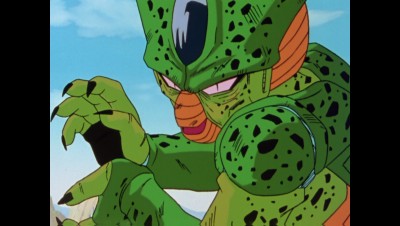
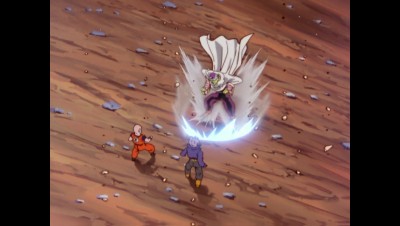
I've been a fan of Dragon Ball Z for well over a decade, and I've seen all 291 episodes multiple times in both English and Japanese. This unfortunately gave me a negative bias towards Dragon Ball Z Kai, but now that I really can't justify sitting down and watching that much television over a reasonable period of time, the option of Kai was looking pretty good. I'm man enough to admit when I was wrong, and, well, I was wrong. The new script, editing and splicing really served the third season quite well. The Androids Saga is the one saga post revision, that feels like it has some inherent filler. This is especially true since its major purpose is to reveal the villain for the next season. That being said, the action and pace are quite remarkable, and often made me forget the fact that the fight against the androids really doesn't add much to the series. As an added incentive to keep watching, there are some new plot twists that make the same basic outline feel as fresh as ever. The remastered audio/visual presentation bests the previous DVD boxed sets, for sure, but the extras are practically non-existent. However, Dragon Ball Z Kai - Season 3 still comes highly recommended. I would advise those uninitiated with the series to still try the original, uncut 291 episode DBZ before taking on Kai though. Watching the truncated version of the series is likely to rob you of a far more rewarding (and equally frustrating) experience. If you can't justify setting aside that much time and money, Dragon Ball Z Kai is still a great option for vets and newcomers alike.

"As nice of an idea as Dragon Ball Z Kai was, I personally feel it took away one of the greatest strengths from the series as a whole - The sagas all made use of the (very) slow burn technique, but that's what made many of the big reveals such a big payoff. You invested your time hanging on the edge of your seat, and in the end you were greatly rewarded. Kai offers all the payoff with little build-up or viewing discipline, and in my opinion, greatly reduces the effect of many of the best moments the series has had to offer." - From my Dragon Ball Z Level 1.1 review
The nice thing about opinions? They're always subject to change.
At the time of that writing, I was against the idea of Kai (which in and of itself means 'revised') based on principle. With new technology spilling out by the minute, the latest generation has had their attention span reduced to nanoseconds. That may seem like an unfair assessment, but just think about the current trends in entertainment - Setting aside the time to listen to an album as a whole has gone by the wayside. Now, music is played on devices dedicated to shuffling songs. Sitting down to watch a movie is also hindered, as people constantly take themselves out of the experience to play with their cell phones. So, I felt that Kai was attempting to grab the attention of future generations by replacing the slow burning fuse of DBZ with a speedy trail of gunpowder instead.
Part of the fun of watching Dragon Ball Z, at least the first time around, was playing the waiting game. There were plenty of episodes that did little more than focus on stalling the villain, powering up a (hopefully) devastating attack, or having the main characters go off on needless diatribes. This may sound less than ideal, but it was all done to build the anticipation before delivering exactly what you were waiting for. At least, that's what I used to think. Don't get me wrong - I still think in its uncut form, DBZ is the only way to go about watching the series for the first time. On subsequent viewings? Well, being a husband and father, finding the time to choke down almost 300 episodes is nearly impossible. I have a huge backlog of movies and television shows that I would like to eventually get through, and outside of that, I have a social life and I'm trying to learn how to forge/blacksmith. Suddenly, the convenience of Dragon Ball Z Kai was looking pretty good...


After doing a bit of research, I found that Dragon Ball Z Kai was done to celebrate the 20th anniversary of the show. Although I'm still thoroughly convinced it was merely a way to keep the series 'milkable' for generations to come, my interest was fully piqued with the changes that were going to be made to the series. For one, Kai was going to drop everything that happened after the Cell Games Saga. The fact that I'll never have to watch the Great Saiyaman in action again thrilled me to no end. Second, new scripts and dialogue were written in order to emulate the original Manga as close as possible. A new English dub was done with most of the original cast, and if any animation was deemed unfit for high-def viewing, it would be replaced. The end result? 291 episodes have now been effectively reduced to a manageable 98.
********
The previous season of Dragon Ball Z Kai was a wild ride, but things were beginning to feel too formulaic. There's no question that Season Three needed to change things up, and drastically at that. After battling Radditz, two additional Saiyans, the Ginyu Force/Captain Ginyu and the nearly invincible Frieza, the series was repeating itself exhaustively. Everything was the same - There's a warning about some bad guys coming, the Z Force train for a while, the bad guys arrive and discard of Goku's friends one by one, until he eventually enters the fray at the last minute to partake in an epic battle to save the world from certain doom. The third season is comparatively similar, as this tired formula is still at the center of all the action. So, why is it that the third season still actually works as well as everything that came before it?
In short, the moving parts helping to drive the story have been altered significantly, and although things are more or less the same, there's additional layers that have been added to the story in an attempt to keep things fresh:
The Z Force fighters can't believe their eyes when Frieza comes back from the grave to threaten their existence yet again, but a mysterious stranger from the future, a Super Saiyan at that, arrives and puts an end to the white and purple tyrant without so much as breaking a sweat. The mystery Saiyan then conveys that a pair of androids, instruments designed by a mad scientist who is looking to settle a score, will appear in a few short years to destroy Goku. Furthermore, the fighter from the future also reveals that Goku is suffering from an incurable form of heart disease, and may not live long enough to neutralize the android threat. So, the Z Force goes into training, and three years later they finally get to size up their opponents. Unfortunately, the two androids turn into more, and in typical Dragon Ball fashion, they prove to be nearly invincible adversaries. Even then, these machines seem like tinker-toys compared to the villain that reveals himself near the end of the season - The android Cell.
The third season's storyline packs a bit more drama and introduces new elements of danger. The fact that Goku is dealing with a serious heart condition really ups the ante, as he could perish before the androids have a chance to be dismantled in battle. It's a game changer, for sure, as the other Z Fighters would really be lost without their ace in the hole. Normally we have to wait for Goku to arrive at the battlefield, but having him instead fight against a ticking clock is a breath of fresh air. Going into further details about the season would undoubtedly spoil some of the story, so I'll merely say that there are some major twists along the way that not only shocked the Z Force fighters, but left my jaw agape the first time I watched the series. I was concerned that some of the major story elements in season three would be hampered by revisions and editing, but Kai is very careful not to cut anything that would leave viewers scratching their heads.


No, the only real downside to the Androids Saga is that it's not as self contained as the Saiyan or Frieza sagas. After all is said and done, the third season merely acts as a lengthy build-up to Cell's big reveal. As many of you already know, Cell ends up being the main antagonist throughout the fourth and final season of Kai, and since everything in the third season culminates to his arrival, this batch of episodes ends up feeling a bit more disposable than the rest. Don't get me wrong - I enjoy the Androids Saga for everything it has to offer, but it's this particular reason that I find the third season to be the weakest of the bunch, despite the fact the story decidedly took some bold changes and managed to keep the series feeling fresh, if not invigorated (in a way).
That being said, Dragon Ball Z has never really been about producing strong storytelling devices, right? Right. It's about action, pure and simple. Yes, introducing Goku's heart disease and unveiling a mysterious Super Saiyan from the future is a big step in the right direction, but there's nothing revolutionary about that. No, it's the increased action and pace that make the third season so exhilarating. Everyone steps up to the plate this time around and shows us levels of power unlike anything we've seen before. I know there are probably a lot of people that disagree with me in the respect that this season almost feels like filler material, especially since it extends on a plot point that was originally introduced in the original Dragon Ball series. Still, it's a minor quibble, as this is the most intense and action packed DBZ thus far. For those of you who are watching for action for action's sake, you just might find this to be the best season yet.
********
The more I watch Kai, the more I consider it to be my preferred version of Dragon Ball Z. That being said, this new iteration of DBZ still leaves a bit to be desired - Some of the vocal talent had to be replaced due to unavoidable circumstances, and some of it seems to be inferior to the English dubs that came before it. Also, the amount of blood and 'gore' (if you can call it that) has been toned down a bit. Although this is nothing new to those familiar with DBZ in the States, this still comes as something of a head scratcher. After all, the series is practically bathed in one form of violence or another, so why go through the trouble of censoring a little blood? Despite these minor quibbles, the good outweighs the bad by a large margin. The English dub is now more faithful to the Japanese script, and returning cast members deliver a performance that easily bests their work on the first go-round. Even though there still may be a small amount of questionable filler left in the mix, the revisions keep the action fast and furious without compromising any vital bits of story. One of the reasons why Dragon Ball Z had so much filler to begin with, was so the series wouldn't catch up to the Manga and be left with no story to tell. Now that the filler has been mostly removed, the series really does seem like it's found new life and can withstand numerous repeated viewings.
There's still something to be said about having patience and enduring the slow burn in the original series. In fact, I still highly recommend that newcomers watch Dragon Ball Z in its uncut form to experience that effect, but for the previously initiated, Kai is a breath of fresh air. Not just in its drastic reduction from 291 episodes to a brisk 98, but since there are only four seasons to purchase (or 8 'parts' that are half the price of the full season set), you don't have to sacrifice your bank account or even a lot of shelf space to store the series. Even if you do decide to start with Kai right off the bat, I can say with confidence that you won't come out at the end feeling like you've watched a gimped version of the show. As a DBZ veteran myself, I wasn't made to feel that way either. You can't go wrong with Kai, familiar with the original source or not.


I was somewhat underwhelmed by the 1080p, AVC encoded image (4:3), but that's probably because I've watched the Level sets prior to seeing Kai. The Level sets were a massive undertaking by FUNimation, as the original 16mm elements were scanned and were subsequently subjected to a clean-up project that fortunately didn't implement any digital noise reduction. What we were given was an image that was as faithful to the source as possible, and for the first time ever, actually allowed Dragon Ball Z to look like film as opposed to the overly contrasted Dragon Box sets, or the cropped digitally scrubbed 'Orange Brick' season sets.
Dragon Ball Z Kai features an HD remaster from Toei Animation's source, and they've painstakingly cleaned up most of the imperfections, which results in a respectably clean presentation. The image is a little on the soft however and is mostly devoid of grain, so some DNR is evident. That being said, I'm not exactly sure I blame them for doing so. DBZ has always looked 'clean' on television, but more important, any section of animation that was deemed unfit for HD was actually replicated with new animation. I assume 'cleaning' the source of heavy grain would allow the new animation to fit with the old seamlessly, and I have to say that I'm pretty impressed with the results. Shadowing and changes in line consistency are dead giveaways, but if you're not one to notice that sort of thing you'll be hard pressed to notice where the new footage has been spliced with the old. This is especially impressive when one considers that there are new pieces of animation also created for the purpose of bridging minor story gaps.
As far as the technical presentation on these discs, there's really nothing to complain about. Black levels are fairly solid, contrast and colors are presented without the harsh boosting that was apparent on the Dragon Box sets, and digital anomalies are minimal even at their very worst. After all is said and done, Kai isn't the absolute best I've seen Dragon Ball Z look to date, but it's still a nice leap from the previous DVD incarnations that didn't have a lot going for them in the first place.
This release contains both Japanese and English audio tracks (Dolby TrueHD 2.0 and Dolby TrueHD 5.1 respectively), and these are brand spankin' new in every conceivable way. Both languages feature newly recorded dialogue from (most of) the original voice actors, and they now sound clean as a whistle. Unfortunately, the rest of the sound design is still somewhat flat, but the English 5.1 track actually does a decent job of separating effects across all channels. It's not a completely immersive experience or anything, but it's appreciable nonetheless.
It's the music that may make some people do a double take - A new musical score was done by Kenji Yamamoto, who has some experience composing tunes for the DBZ video games. He was laid off by Toei Animation though, as it was discovered he was stealing music from other artists in the business. Toei Animation had no other choice but to replace Yamamoto's music with that of Shunsuke Kikuchi, who created the original soundtrack for the Japanese series. In the States however, we had already received the first two seasons of Kai on Blu-ray, so they were pulled from the market and were replaced with the Kikuchi score some time later. Part 5 was also delayed in the States to accommodate the change in score. Personally, I have zero problem with the change. I love the original Japanese score (even though the music used on Toonami back in the day will always hold a special place in my heart), and I am not cool with someone plagiarizing the work of others. Toei did the right thing, and still having a (reworked) version of the original score is ideal. Unfortunately, the score is still rather flat, but the music doesn't really need to be all that immersive. It just needs to drive the story along.
Much like the video presentation, the audio is good, but not great. On the technical side of things however, there's absolutely nothing to complain about. Dialogue isn't 'thin' or tinny, and the sound effects sound better than ever.
Like most other Dragon Ball Z Kai 'Parts' and season sets, there's next to nothing in the way of supplements. All we have are the opening and closing songs available with no text to obscure the animation.


I've been a fan of Dragon Ball Z for well over a decade, and I've seen all 291 episodes multiple times in both English and Japanese. This unfortunately gave me a negative bias towards Dragon Ball Z Kai, but now that I really can't justify sitting down and watching that much television over a reasonable period of time, the option of Kai was looking pretty good. I'm man enough to admit when I was wrong, and, well, I was wrong. The new script, editing and splicing really served the third season quite well. The Androids Saga is the one saga post revision, that feels like it has some inherent filler. This is especially true since its major purpose is to reveal the villain for the next season. That being said, the action and pace are quite remarkable, and often made me forget the fact that the fight against the androids really doesn't add much to the series. As an added incentive to keep watching, there are some new plot twists that make the same basic outline feel as fresh as ever. The remastered audio/visual presentation bests the previous DVD boxed sets, for sure, but the extras are practically non-existent. However, Dragon Ball Z Kai - Season 3 still comes highly recommended. I would advise those uninitiated with the series to still try the original, uncut 291 episode DBZ before taking on Kai though. Watching the truncated version of the series is likely to rob you of a far more rewarding (and equally frustrating) experience. If you can't justify setting aside that much time and money, Dragon Ball Z Kai is still a great option for vets and newcomers alike.
-About the Author- Michael Zupan is primarily a film guy, but has a variety of places where you can enjoy his work otherwise. Check Bytesizeimpressions.com for video game op-ed pieces and podcasts, and be sure to check out the sister site, Byte-Size Cinema, linked up top. This writer also contributes significantly to in-print magazines such as Minecraft Explorer and Fortnite Explorer!
|
| Popular Reviews |
| Sponsored Links |
|
|
| Sponsored Links |
|
|
| Release List | Reviews | Shop | Newsletter | Forum | DVD Giveaways | Blu-Ray | Advertise |
|
Copyright 2024 DVDTalk.com All Rights Reserved. Legal Info, Privacy Policy, Terms of Use,
Manage Preferences,
Your Privacy Choices | |||||||













